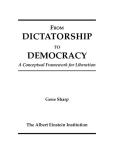3 March
2011
What Libyan and Other Jasmine Revolutionaries Owe Burma
Posted in Africa, Burma, Middle East
 Part one of a series written by a guest blogger:
Part one of a series written by a guest blogger:
‘Burma leads the world!’ – not a common headline. And yet, this should be the sub-heading behind every newspaper cover story of the Middle East uprisings taking place right now.
Why? The (non-violent) revolution handbook used in each of these settings was originally written to ‘free’ Burma from its ‘nasty’ military rulers. First published in English, by American Gene Sharp, this handbook has been translated into over 30 other languages… including Arabic.
Even though revolutions don’t necessarily take place within the target community in mind – after all, Karl Marx thought industrialised countries, rather than feudal Russia, would take the lead in instituting socialism – credit should be given to Burma for the inspiration behind From Dictatorship to Democracy, as Sharp’s seminal work is called.
The Burma lead
It was Burma that inspired Sharp’s analysis, concrete recommendations and method of distributing his ideas for non-violent intra-national change. His ideas are not largely new. He did, however, distill and systematise decades of thought and action and then pamphleted them in a short handbook, ideal for the pockets of ordinary Burmese folk, literate but isolated. A Burmese language version soon followed. Non-Burmese English readers, however, soon saw the potential of this work to militarise (for Sharp, non-violent action is ‘a form of combat’) many powerless and defenceless civilians beyond Burma. So, for people with this back-pocket handbook in their own language, there was now another (generic) alternative to institutional change via the bullet or the ballot, namely, defiance. Not all the Jasmine revolutions have been non-violent. Their inspirations, however, were just that.
The debt owed to Burma deepens
 If Burma has helped to formalise another weapon in the arsenal for change, it should also be credited with showing how not to use it. Change for its own sake has never appealed to the Burmese. There is much worth preserving in the status quo: the importance of family, gender equality (better than most in the West), and a sense of fair play are all part of this country. One Burman (not a Karen or another member of an ethnic minority) pointed out the futility of assassinating ‘nasty’ dictators. Having grown up with their sons and daughters, he could see that he would have to remove an entire ‘clan of evil’ if the killings were to start. However, he added, he could see that some children were wholly unlike their unpopular parents, while those who would comfortably step into the dictators’ shoes had no family connection. Trying for ideological, racial or familial ‘purity’ to solve Burma’s problems, then, was not the answer. He was almost echoing Lord Acton’s famous conclusion: ‘the danger is not that a particular class is unfit to govern: every class is unfit to govern’.
If Burma has helped to formalise another weapon in the arsenal for change, it should also be credited with showing how not to use it. Change for its own sake has never appealed to the Burmese. There is much worth preserving in the status quo: the importance of family, gender equality (better than most in the West), and a sense of fair play are all part of this country. One Burman (not a Karen or another member of an ethnic minority) pointed out the futility of assassinating ‘nasty’ dictators. Having grown up with their sons and daughters, he could see that he would have to remove an entire ‘clan of evil’ if the killings were to start. However, he added, he could see that some children were wholly unlike their unpopular parents, while those who would comfortably step into the dictators’ shoes had no family connection. Trying for ideological, racial or familial ‘purity’ to solve Burma’s problems, then, was not the answer. He was almost echoing Lord Acton’s famous conclusion: ‘the danger is not that a particular class is unfit to govern: every class is unfit to govern’.
Revolutions – he continued – have the danger of coming full circle. Even if disintegration (Sharp’s term for defeat of the governing body) led to democracy, disappointment could soon follow, leading to another disintegration and a downward spiral. Such an observation, coming from a Buddhist brought up on the cosmological cycle of birth-death-rebirth is not insignificant. Nor is the junta’s aim for universal principles to guide its citizens something to sneer at. Many in Burma recognise that the West’s attempt at diversity merely delays the push towards this final state. After all, Plato recognised centuries ago in The Sophist that the ultimate arguments are between the gods and the giants – between those who see this life (and its political institutions) as a step, and those who see them as a stop. Small wonder, then, that Sharp’s ideas did not take root.
Which is the best type of political set-up, then, to encourage the development (and not just in the economic sense) of humanity and finally solve the gods-giants debate? Do not be surprised if the Burmese come up with a new answer or confirm an old but updated one. With Burmese ideas, such as knowing how to deal with superpower neighbours and the removal of the right to silence in criminal cases (to name but two), being adopted by many small and medium-sized countries, and even a few former great powers, it is quite possible that a future newspaper’s main headline will read: ‘Burma leads the world!’…
Related Posts:
Leave a Reply to Thomas More Institute Cancel reply